A Moonlit Family Affair
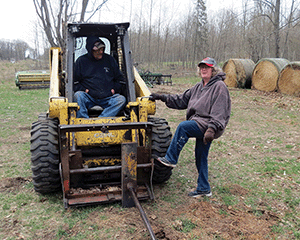 Tiffany Jones is the fifth generation to generate income from the farm nestled in the mitten of Michigan, near Falmouth. Her parents Sonya and Doug anchor this multi-generational operation, along with support from Tiffany’s sister Chelsea Smith, her husband Jordan, and their children – the sixth generation – who live down the road.
Tiffany Jones is the fifth generation to generate income from the farm nestled in the mitten of Michigan, near Falmouth. Her parents Sonya and Doug anchor this multi-generational operation, along with support from Tiffany’s sister Chelsea Smith, her husband Jordan, and their children – the sixth generation – who live down the road.
“I garden in the same place as my great-grandparents, and walk some of the same fence lines,” Tiffany says. “Some of the fruit is from a tree planted before I was born.”
The Jones family not only faces the formidable challenge of operating a diverse 40-acre farm in today’s large-scale monoculture agriculture. They’re also working around the physical challenges of individual family members. To succeed, they’re relying on the multi-generational knowledge of family – and a newer relationship with Michigan AgrAbility.
The farm transitioned from a dairy operation. Doug’s dad, known as Buck, died when Doug was 14 years old, and the cows were sold. After Tiffany and Chelsea went to college, Doug and Sonya relied on off-farm jobs, along with a few horses, beef cattle, and garden produce.
Chelsea earned a degree in dairy management at Michigan State University. Tiffany received a B.S. in environmental biology from Ferris State University, and then traveled to Germany, where she lived for six years. “My sister and I always planned to stay in ag,” Tiffany says. But the path wasn’t necessarily straightforward.
Tiffany worked at an organic farm with 5,000 laying hens and 40 head of beef cattle in northwest Germany. She also earned a master’s degree in organic agriculture and food systems from the Universitat of Hohenheim in Stuttgart.
Five years ago, she moved back to Michigan. “We decided to make the farm a business again,” Sonya says. Tiffany began taking organically raised produce to weekly farmer’s markets in Cadillac, Houghton, and Roscommon. They rented 30 acres for hay.
To grow their market footprint, the Joneses created a memorable farm name, Moonlit Farm. “Our grandfather planted by the moon,” Tiffany says.
They also revived beekeeping. Tiffany’s great-grandfather kept bees, and her great-uncle had an apiary. “We had a generational knowledge,” she says. They began selling honey, along with eggs from 15 free-range laying hens. After increasing from two hives to 15, Tiffany added honey soap, candles, and lip balm. She recently began selling cut and dried herbs, and they’ve planted a few grapevines.
Moonlit Farm raises 70 hens, ducks, geese, and turkeys. The Smiths contribute grass-fed beef and lamb, and purchased a CNC (computer numerical control) machine to create sheet metal signs and decorative items. They’ve also added 73 acres.
Assistive technology to the rescue
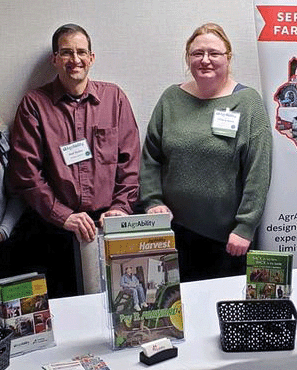 Although returning the farm to a profit center has been a labor of love, the labor seemed overwhelming in the beginning. “The farm was hard on my knees, hands, and back, due to arthritis,” Sonya says. Doug also has knee pain. In 2020, Tiffany was diagnosed with thyroid cancer, and had two surgeries, followed by radiation. “Thyroid is hard to regulate, so fatigue is an issue,” she says.
Although returning the farm to a profit center has been a labor of love, the labor seemed overwhelming in the beginning. “The farm was hard on my knees, hands, and back, due to arthritis,” Sonya says. Doug also has knee pain. In 2020, Tiffany was diagnosed with thyroid cancer, and had two surgeries, followed by radiation. “Thyroid is hard to regulate, so fatigue is an issue,” she says.
Doug and Sonya learned about Michigan AgrAbility at the Michigan Family Farm Conference in Kalamazoo. AgrAbility helps farmers manage chronic back pain, joint injuries, amputations, spinal cord injuries, hearing loss, and other disabling conditions. It partners Michigan State University and Easterseals Michigan.
Ned Stoller, an AgrAbility ag technology specialist and ag engineer, visited their farm in April 2020. “The foundation of the first visit is a farm tour, and learning what tasks are painful,” he says. He gave Sonya a set of wrist hooks to strengthen her grip carrying buckets.
Stoller helped the Joneses sign up as a Michigan AgrAbility client. They obtained funds to buy a blueberry rake for harvesting strawberries and blueberries. “It has fine fingers along the edge of a little box with a handle, and it plucks and drops fruit into the box,” he says. He recommended applying for a folding garden kneeler bench.
These small steps proved to the Joneses that AgrAbility could provide real benefits.
Stoller followed up by building two prototypes: (1) a squash picker and (2) grab bars for the skid loader. “The squash picker is like a pitchfork with sideways tines to harvest without bending,” he says. “I bolted telescoping grab bars onto the skid loader cab for hand support, relieving knee pressure.”
He adds, “AgrAbility likes to plant the seeds. We come up with ideas as we learn from each other. High tech is good, but I don’t go there first. I love to tinker with simple solutions. Small adaptations often add up to big improvements.”
Each box on the vertical stackable beehive weighs up to 50 pounds, and lids must be manually lifted to feed bees and check for mites. Stoller suggested a mechanical beehive lifter to relieve arthritis pain in wrists and fingers. “It’s a two-wheel dolly that eliminates lifting and twisting the back,” he says.
Doug Jones also has built labor-saving innovations, including raised beds. He designed chicken coops for easy cleaning: opening a door allows manure to be scraped onto a sloping ledge and into a skid steer bucket below. “There’s no need for a pitchfork,” Stoller says.
Agritourism is natural fit
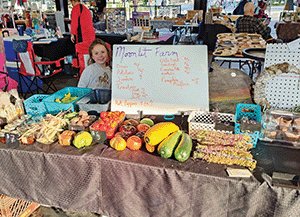 The Joneses haven’t given up their day jobs. “We all work outside the farm, but love farming so much we can’t stop,” Tiffany says.
The Joneses haven’t given up their day jobs. “We all work outside the farm, but love farming so much we can’t stop,” Tiffany says.
She’s studying to become a clinical herbalist to improve holistic health. Her newest products are herbal salves and tinctures.
Moonlit Farm held its first Midwest Bear Fest last September, featuring on-site camping, kids’ activities, and workshops on chicken butchering, beekeeping, chainsaw maintenance, and horseshoeing. A main meat dish was provided for a family style potluck.
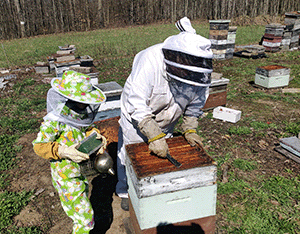 The festival ties into the homesteading trend, and the traditions of Moonlit Farm. “Homesteading connects us to our ancestors,” Tiffany says. “It’s amazing to witness each generation change and adapt. We’re building for generations to come, and learning from generations past.”
The festival ties into the homesteading trend, and the traditions of Moonlit Farm. “Homesteading connects us to our ancestors,” Tiffany says. “It’s amazing to witness each generation change and adapt. We’re building for generations to come, and learning from generations past.”
Stoller adds, “It’s an honor to be a small part of the Joneses’ sustainable efforts to farm in spite of their medical conditions. AgrAbility is just one piece of the puzzle. As we keep walking alongside farmers with disabling conditions, we can help older generations maintain their work roles longer, while the younger generations learn from them.”
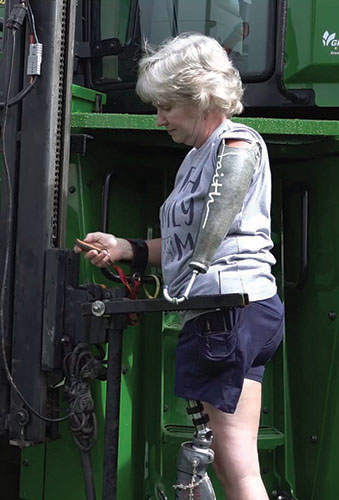
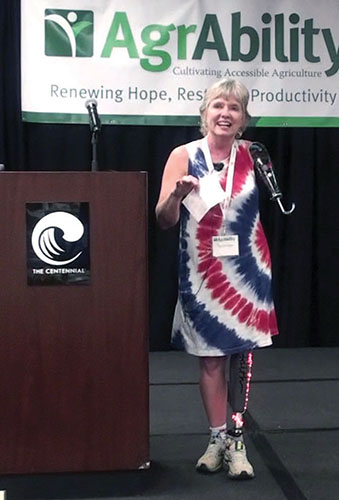
 Tiffany Jones is the fifth generation to generate income from the farm nestled in the mitten of Michigan, near Falmouth. Her parents Sonya and Doug anchor this multi-generational operation, along with support from Tiffany’s sister Chelsea Smith, her husband Jordan, and their children – the sixth generation – who live down the road.
Tiffany Jones is the fifth generation to generate income from the farm nestled in the mitten of Michigan, near Falmouth. Her parents Sonya and Doug anchor this multi-generational operation, along with support from Tiffany’s sister Chelsea Smith, her husband Jordan, and their children – the sixth generation – who live down the road. Although returning the farm to a profit center has been a labor of love, the labor seemed overwhelming in the beginning. “The farm was hard on my knees, hands, and back, due to arthritis,” Sonya says. Doug also has knee pain. In 2020, Tiffany was diagnosed with thyroid cancer, and had two surgeries, followed by radiation. “Thyroid is hard to regulate, so fatigue is an issue,” she says.
Although returning the farm to a profit center has been a labor of love, the labor seemed overwhelming in the beginning. “The farm was hard on my knees, hands, and back, due to arthritis,” Sonya says. Doug also has knee pain. In 2020, Tiffany was diagnosed with thyroid cancer, and had two surgeries, followed by radiation. “Thyroid is hard to regulate, so fatigue is an issue,” she says. The Joneses haven’t given up their day jobs. “We all work outside the farm, but love farming so much we can’t stop,” Tiffany says.
The Joneses haven’t given up their day jobs. “We all work outside the farm, but love farming so much we can’t stop,” Tiffany says. The festival ties into the homesteading trend, and the traditions of Moonlit Farm. “Homesteading connects us to our ancestors,” Tiffany says. “It’s amazing to witness each generation change and adapt. We’re building for generations to come, and learning from generations past.”
The festival ties into the homesteading trend, and the traditions of Moonlit Farm. “Homesteading connects us to our ancestors,” Tiffany says. “It’s amazing to witness each generation change and adapt. We’re building for generations to come, and learning from generations past.”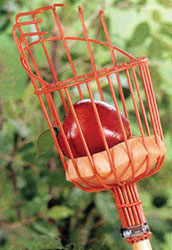 Pole-Mounted Fruit Picker
Pole-Mounted Fruit Picker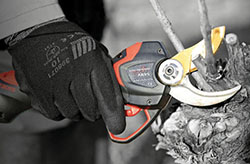 Battery-Powered Hand-Held Pruning Shears
Battery-Powered Hand-Held Pruning Shears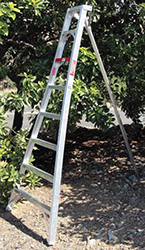
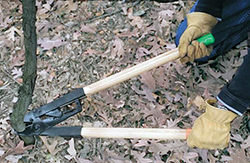 Ratcheting Lopper
Ratcheting Lopper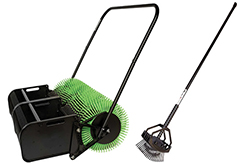
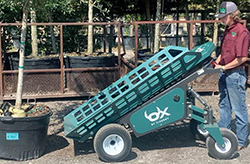 The Ox Powered Transporter
The Ox Powered Transporter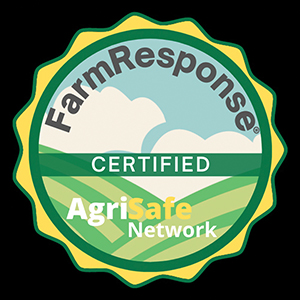
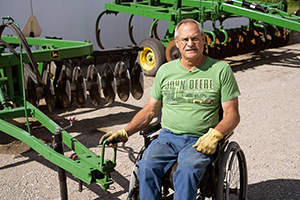
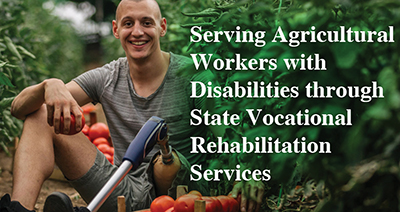 State vocational rehabilitation (VR) agencies are crucial to the success of farmers and ranchers with disabilities. For example, since AgrAbility cannot provide funding or equipment through its USDA grants, state VR is often the primary source for acquiring the often expensive assistive technologies that AgrAbility clients need to continue pursuing their livelihoods. However, as with any government agency, regulations can be complicated, and sometimes our farmers have trouble receiving VR services.
State vocational rehabilitation (VR) agencies are crucial to the success of farmers and ranchers with disabilities. For example, since AgrAbility cannot provide funding or equipment through its USDA grants, state VR is often the primary source for acquiring the often expensive assistive technologies that AgrAbility clients need to continue pursuing their livelihoods. However, as with any government agency, regulations can be complicated, and sometimes our farmers have trouble receiving VR services.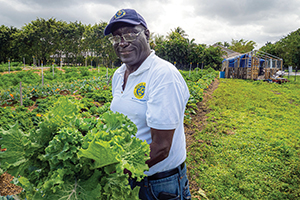 Some might envision Florida as mainly a vacation wonderland, but it is also a major agricultural producer. The state grows large percentages of all U.S. citrus fruits, fresh market tomatoes, sweet corn, watermelons, and indoor foliage plants, among many other crops.
Some might envision Florida as mainly a vacation wonderland, but it is also a major agricultural producer. The state grows large percentages of all U.S. citrus fruits, fresh market tomatoes, sweet corn, watermelons, and indoor foliage plants, among many other crops.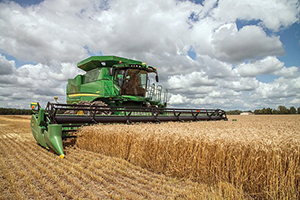 This midwestern agricultural powerhouse was one of the original eight AgrAbility states funded in 1991, and it has received USDA funding during approximately 20 of the 30 years that AgrAbility has existed.
This midwestern agricultural powerhouse was one of the original eight AgrAbility states funded in 1991, and it has received USDA funding during approximately 20 of the 30 years that AgrAbility has existed.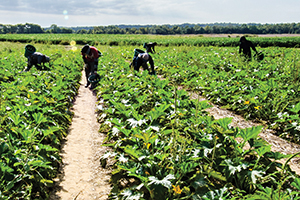 AgrAbility historians might remember that South Carolina had an AgrAbility project in the early 1990s, but it’s been without AgrAbility services since then. That drought ended last year when the Clemson University Extension Service submitted a successfully funded proposal in partnership with South Carolina State University (a historically Black 1890 land-grant institution), and Able South Carolina (a center for independent living).
AgrAbility historians might remember that South Carolina had an AgrAbility project in the early 1990s, but it’s been without AgrAbility services since then. That drought ended last year when the Clemson University Extension Service submitted a successfully funded proposal in partnership with South Carolina State University (a historically Black 1890 land-grant institution), and Able South Carolina (a center for independent living).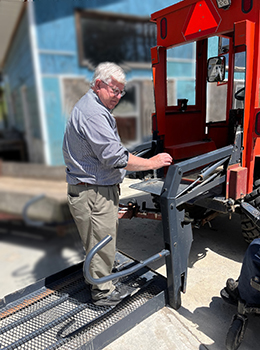 John Hostetler works at a sawmill outside Addison, New York. He’s a member of the Old Order Amish community and has been a wheelchair user for many years. Each workday he commutes five miles to the mill in a Kubota tractor he and a friend modified with a rear-mounted, battery-operated lift, modified steering, and hand controls. AgrAbility Project Director Bill Field recently visited John and tried out the lift.
John Hostetler works at a sawmill outside Addison, New York. He’s a member of the Old Order Amish community and has been a wheelchair user for many years. Each workday he commutes five miles to the mill in a Kubota tractor he and a friend modified with a rear-mounted, battery-operated lift, modified steering, and hand controls. AgrAbility Project Director Bill Field recently visited John and tried out the lift. AgrAbility’s in-person training events are reaching new regions of the country. On October 17-18, 2023, National AgrAbility hosts “Mālama the Farmer: Caring for Yourself and Each Other,” at the Grand Naniloa Hotel in Hawaii. This workshop is planned in conjunction with and supported by the Western Regional Agricultural Stress Assistance Program and the University of Hawaii, and will focus on behavioral health resources, assistive technology, preventing injury, and business planning.
AgrAbility’s in-person training events are reaching new regions of the country. On October 17-18, 2023, National AgrAbility hosts “Mālama the Farmer: Caring for Yourself and Each Other,” at the Grand Naniloa Hotel in Hawaii. This workshop is planned in conjunction with and supported by the Western Regional Agricultural Stress Assistance Program and the University of Hawaii, and will focus on behavioral health resources, assistive technology, preventing injury, and business planning. The 2024 AgrAbility National Training Workshop is heading for Atlanta, Georgia on March 25-28 at the Grand Hyatt Atlanta/Buckhead. Join hundreds of farmers, ranchers, and professionals from agriculture and rehabilitation for four days of informative breakout sessions, inspiring plenary speakers, and interesting tours.
The 2024 AgrAbility National Training Workshop is heading for Atlanta, Georgia on March 25-28 at the Grand Hyatt Atlanta/Buckhead. Join hundreds of farmers, ranchers, and professionals from agriculture and rehabilitation for four days of informative breakout sessions, inspiring plenary speakers, and interesting tours.